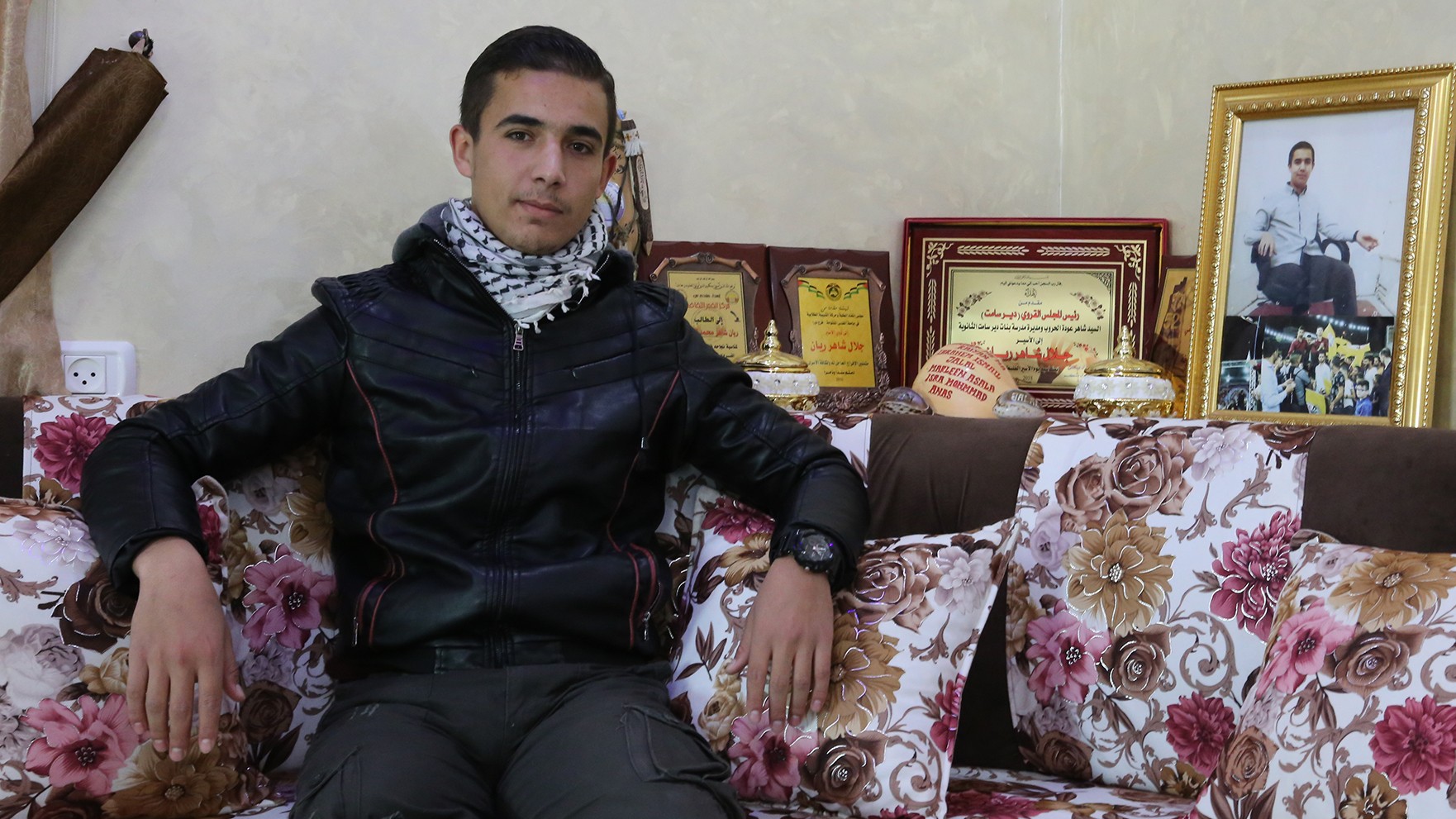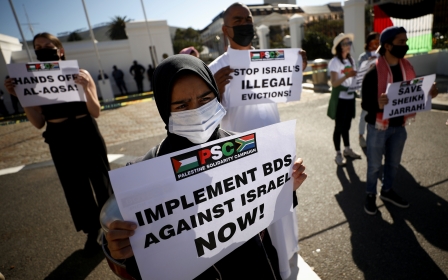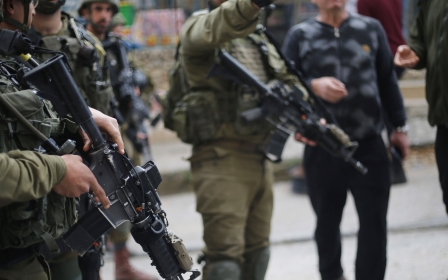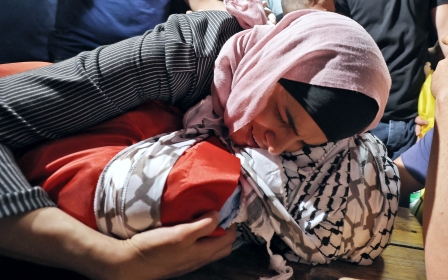'I was crying': The plight of wounded Palestinian children in Israeli custody
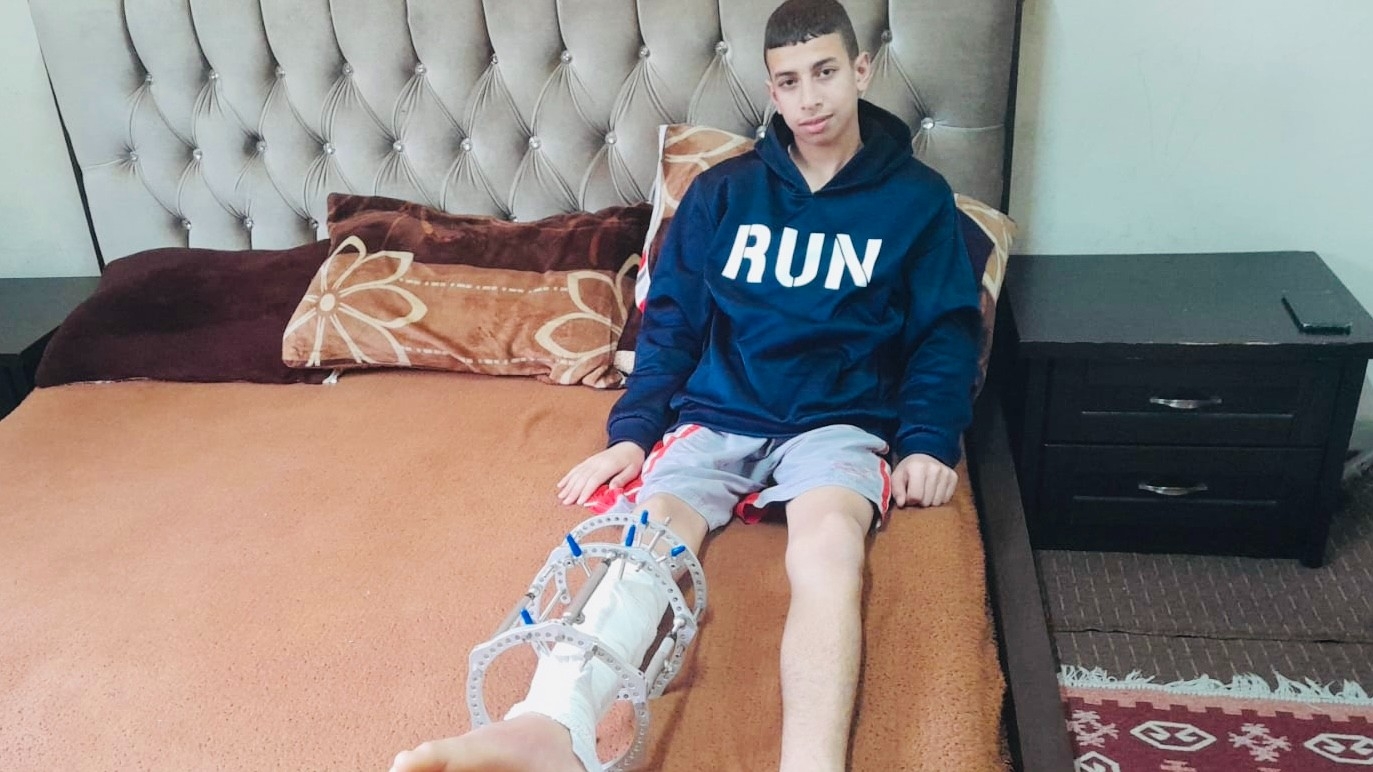
Palestinian children detained by Israeli forces after being shot suffer medical negligence in custody, which exacerbates their physical and mental health conditions, according to testimonies shared with Middle East Eye.
The life of 13-year-old Palestinian boy Amir Al-Biss has been upended since he was shot and detained by Israeli soldiers at the beginning of March.
Although Amir was released on 13 March, he still suffers from two bullet wounds to his right leg. He remains bedridden and can’t go to the bathroom on his own.
The attack took place on 4 March, when Amir was walking in the street adjacent to Al-Arroub camp, north of Hebron in the occupied West Bank. He was met by a group of Israeli soldiers who shot him directly.
"He was walking alone without posing any danger to the soldiers, but they shot him without warning. He was hit by two explosive bullets in the leg, and was arrested immediately and transferred to an Israeli ambulance," says Amir's father, Mohamed Al-Biss.
New MEE newsletter: Jerusalem Dispatch
Sign up to get the latest insights and analysis on Israel-Palestine, alongside Turkey Unpacked and other MEE newsletters
Although news of the attack reached Amir's family, they didn't know his whereabouts until three days later, via a lawyer. His parents were anxious because they didn’t have any information about his medical condition. Their request to see him during his detention was rejected.
His father said Amir went through difficult days in Shaare Zedek Israeli Medical Center, where he was chained to a bed and kept under strict surveillance by Israeli soldiers, who asked him to walk despite his serious leg injury.
Sent to prison
According to Amir's father, the bullets shattered the bone in his leg, which continues to cause him severe pain that sometimes deprives him of sleep. After several days in the hospital, he was transferred to the infamous Ramla prison, where he was subjected to maltreatment and abuse by the Israeli guards.
“One of the guards pushed him to the ground on his wounded leg, which caused him severe pain and bleeding, and he wasn’t receiving proper food and couldn’t carry out his daily needs on his own, which affected his mental health,” his father added.
'He was walking alone without posing any danger to the soldiers, but they shot him without warning'
- Father of Amir Al-Biss
Amir was released after his family paid a fine, but he is still suffering from the injury and is waiting for his transfer to the hospital, to begin a long journey of treatment that may prevent him from playing with his friends for many months.
During 2022, the Palestine Centre for Prisoner Studies, a Palestinian rights group, documented the arrest of more than 850 children by the Israeli occupation forces, including 45 under the age of 12. Among the detainees were several children who were wounded by soldiers’ bullets before their arrest, all of whom were subjected to deliberate medical neglect.
The centre explains that the majority of detained children were subjected to one or more forms of humiliation and physical and psychological torture, through a number of tools and systematic methods that violate international norms and conventions on children’s rights.
These violations actually start from the moment of arrest, and continue during the investigation period and detention.
According to the centre, the Israeli occupation forces arrested more than 10 children during 2022 after they were shot and wounded, some of them seriously. The wounded boys were often "left to bleed" before they were taken for treatment.
The rights group added that they were subjected to inhumane investigations and interrogations inside hospitals, and some of them were transferred to interrogation centres after a short period of time, before they completed their recovery.
Leg amputated after neglect
On 10 October 2015, Jalal Al-Sharawneh, who was then 17, was wounded in the leg by a settler's bullets. Israeli soldiers subsequently arrested him on charges of possessing a weapon and being in the Negohot settlement west of Hebron, not far from the town of Deir Samet, where Jalal lived.
Jalal lost consciousness due to the severity of the pain and woke up to find himself chained to a hospital bed in Shamir Medical Center (Assaf Harofeh). As soon as he woke up, an Israeli investigator came in to the room and began interrogating Jalal about the reason for his presence in the settlement.
"I looked at my leg and found it wrapped in a white cloth and it was still bleeding. I couldn’t move it. The officer asked me several questions and I felt pain all over my body. I told him I didn’t know anything, so he poked me on the wound and continued his questions despite my unstable condition," Jalal told MEE.
This situation continued for several days: severe pain, inability to move his leg, and interrogation inside the hospital room.
A month later, Jalal was released from hospital before he finished his treatment and was transferred to Ramla prison (also known as Ayalon) so the Israelis could complete their investigation.
He said that during interrogation sessions in prison, his leg was bleeding but the interrogator neglected his condition.
Due to medical negligence, Jalal's condition worsened. After weeks of confinement in interrogation cells, severe pain, and in light of the harsh cold conditions and indifference of the Israeli prison administration, the prison doctors informed the boy that his leg needed to be amputated.
'The pain at the place of the amputation was terrible... I can’t forget that, I can’t'
- Jalal al-Sharawneh
“I was crying at the time because I didn’t imagine losing it, but the condition I reached as a result of deliberate medical negligence in the Israeli prison was indescribable," he told MEE.
"My amputated leg was released and buried by my family. I stayed for many months in prison, suffering from the physical and psychological effects without receiving any special care.”
Jalal spent three years and four months in prison, during which time he tried to come to terms with his new reality, but the prison conditions were more difficult than he imagined.
“I had difficulty moving around inside the prison and had the help of prisoners to meet my daily needs," he added. "The prison doctors didn’t care about my health, and I wasn’t provided with crutches to facilitate walking except when I went to court sessions. The pain at the place of the amputation was terrible... I can’t forget that, I can’t."
Crying at night
Former prisoner Muhammad al-Qeeq, who was on hunger strike in Israeli prisons, was transferred to Ramla prison in 2016, where he met a number of wounded children.
“I met the two children, Omar Al-Rimawi and Ayham Sabah, each of whom was wounded by several bullets. They were crying at night from the severity of the pain and sometimes screaming because there was no response from the prison administration,” he explained.
Qeeq argues that the prison administration uses the wounds of child prisoners as a means of pressure and torture against them.
At the request of a lawyer, the two children were supposed to be transported to the trial sessions by a special ambulance, but jail officials forced them to take the prisoner transport bus, which consisted of iron seats that hurt even the healthy prisoners.
Omar and Ayham have been in prison for seven years and are serving a life sentence on charges of stabbing a settler to death.
Middle East Eye delivers independent and unrivalled coverage and analysis of the Middle East, North Africa and beyond. To learn more about republishing this content and the associated fees, please fill out this form. More about MEE can be found here.


